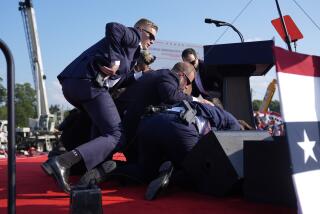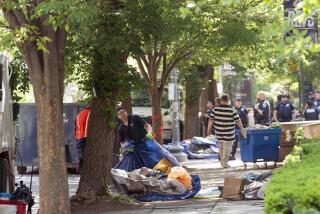A Truce Turns Wary in Nation’s Capital : Homeless: Threats against the President and other officials also have threatened the relationship between police and those who live right outside the White House.
- Share via
WASHINGTON — It was four years ago that David Henry Jackson and his two brotherssettled among the well-tended lawns and pathways of Lafayette Square. There, they met William and Ellen Thomas, already 10-year veterans of the park, and gradually made a place for themselves in their makeshift community.
Of late, however, the Jacksons and the Thomases--and hundreds of others like them at sites scattered across official Washington--have found themselves drawn into an increasingly tense war of nerves with the police.
It is an almost invisible struggle, with no clear-cut villains or obvious solutions. And it is a phenomenon unique to the nation’s capital. Nothing quite like it exists, or probably could exist, anywhere else in the country.
Lafayette Square, like many urban open spaces, is a magnet for homeless people--disoriented victims of drug and alcohol abuse, and the mentally ill. That, however, is not the problem.
The problem is that Lafayette Square lies directly across Pennsylvania Avenue from the White House.
In recent months, the U.S. Park Police, the District of Columbia police and the Secret Service have begun to see the Jacksons and the Thomases and others like them as part of an increasingly alarming threat to the safety of senior government officials from the President on down, and a formerly accommodating relationship between police and their ragged neighbors has begun to break down.
“The police, man, do everything to hassle us, but not to protect us,” said Jackson, who came here to complain about the treatment his father received at a Veterans Administration hospital some years ago. “We’re not a threat to nobody, man. This park is a place to address grievances to national officials. Since I’ve been here, I’ve noticed that people come here from all over the country and from all over the world.”
Surprisingly, police for the most part agree. “The homeless themselves or the demonstrators are not perceived as a real threat,” said Maj. Robert Hines, spokesman for the U.S. Park Police.
What concerns the authorities is the possibility that individuals who are truly dangerous may lurk unnoticed.
Probably nowhere in the country are police more aware of the legal rights of the homeless and of protest groups than here. Few cities have seen more protesters, and with many of the advocacy groups representing homeless people headquartered here, police have learned to tread carefully.
At the same time, given the realities of the nation’s capital, officials are not inclined to take any chances, especially when the heat is on--as it is now.
A series of violent and threatening episodes in the last few months has suggested that the White House and other federal sites have become magnets for unstable individuals who may be armed and dangerous.
Early last fall, Francisco Martin Duran, 26, journeyed to Washington from his home in Colorado and was arrested for allegedly pulling a semiautomatic assault rifle from beneath his overcoat and firing more than two dozen bullets at the north face of the White House. The case is pending.
In mid-December, Secret Service agents discovered that someone had fired at least four bullets into the White House from somewhere in the park-like area, which extends from the South Lawn of the White House down across the Ellipse to the Mall and the Washington Monument.
Four days later, on Dec. 20, the most dramatic and deadly of the recent incidents occurred when a U.S. Park Service officer fatally wounded Marcelino Corniel, a 33-year-old homeless man, on the Pennsylvania Avenue sidewalk in front of the White House.
According to witnesses and a videotape of the shooting, Corniel brandished a large hunting knife taped to his hand as he chased a Park Service officer out of the park and across the street to the sidewalk in front of the White House. After Corniel failed to obey an order to drop the knife, one of several officers present opened fire.
Adding to the authorities’ uneasiness are less publicized but not uncommon incidents such as these:
* On Dec. 23, a man parked a car on E Street south of the White House and ran onto the Ellipse, the grassy area immediately behind the White House. When police chased and caught him, he told them that he had a plutonium bomb.
* Fifteen minutes earlier, police had arrested a 27-year-old man who was carrying a pistol on the Ellipse. He said he had just arrived from Las Vegas and had no address here yet.
* Two days before these incidents, a 44-year-old homeless man was arrested when he ran onto the White House grounds as a gate was opened to admit a vehicle.
*
Against such a background, relations between police, the homeless and the protesters have turned into a bizarre pas de deux--sometimes it is difficult to determine who is leading and who is following.
By day, homeless people and protesters--several dozen of them with crudely constructed signs--squat in Lafayette Square. Others drift through the granite government buildings, troll the Mall for tourists’ spare change or lounge on the muddy grass of the Ellipse.
At night, another scene unfolds. The park dwellers stake out positions in encampments near the White House, the State Department, the Library of Congress and other government complexes, whose huge outdoor steam grates offer protection against freezing cold.
All the while, security officers watch grimly from inside glass-walled guard boxes, occasionally venturing forth to assess potential threats. “We have to keep an eye on them,” said Hines of the U.S. Park Police.
The tension was apparent as a group of homeless men discussed their impressions of police activities on a recent bone-chilling night. “The police hate us,” said one, who, like his buddies, declined to identify himself. “And we hate them.”
As the air grew darker and colder, the men migrated to a steam grate on 17th Street within sight of the White House. There they huddled together in the warm air spewing from below ground. One man crafted a shelter by tying plastic sheeting to the edges of a grate so that it billowed into a makeshift tent.
Asked why he didn’t move to shelter, the man shook his head and replied: “I want to be on my own.”
A Park Police officer patrolled the opposite side of the street, saying nothing but obviously making mental notes of the campsite. “If he don’t bother us, we don’t bother him,” said the man in the tent.
The concern of the police is understandable, but it aggravates people such as Jackson, a long-haired and goateed man of slight build who spends every day holding up a sign on Pennsylvania Avenue.
“I came here with a legitimate grievance with the federal government to address my father’s assassination in a veterans hospital,” he said. “I got no response to my letters and phone calls. So as a law-abiding citizen with no other recourse, I did the American thing. I came here to protest in public. But I never suspected the police would treat me like someone trying to kill the President.”
*
Arthur Spitzer, legal director of the American Civil Liberties Union in the Washington area, said that concern about people like Jackson has been fueled by the sharp rise in concern over security in Washington over the last two decades.
“Ten or 15 or 20 years ago, there were no metal detectors or concrete planters separating the public from buildings,” Spitzer said. “There is no question that government agencies have become more security conscious than they were 20 years ago.”
Jackson and William Thomas say they reject such an analysis, seeing the problem as harassment. “The police are really upset. Their superiors are upset. So they go into this security mode and they can get off doing whatever they want to do to us because they call it ‘national security.’ I’m not buying it,” said Thomas, who has been here protesting the U.S. nuclear weapons policy since 1981.
Some police officials take a more philosophical view of the situation.
“Policing in Washington is unlike policing anywhere else in the world,” Hines said. “This is a fishbowl with national media everywhere and people attracted to this city because they know they will get a lot of publicity for whatever they do.
“Police work in Washington is fairly tense all the time,” he said with a shrug, “because we know we’re always in the limelight.”
The police, man, do everything to hassle us, but not to protect us. . . . This park is a place to address grievances to national officials.
More to Read
Sign up for Essential California
The most important California stories and recommendations in your inbox every morning.
You may occasionally receive promotional content from the Los Angeles Times.













